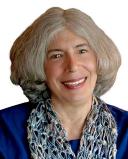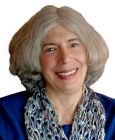Adoption
Adoption Diary Pt. 3: My Daughter in Her Own Words
When she becomes a mother herself, my daughter makes peace with her past.
Posted March 21, 2015
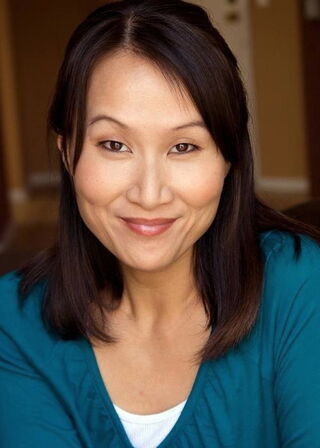
There’s much more to the story of my daughter's adoption than I’ve written about in Part I: Giving Birth in an Airport and Part II: A New Life…and Clues to a Former One. But it’s time to end this set of articles. I can think of no better way to do so than to share with you a remarkable essay that Mara wrote about eight years ago. At the time, her daughter, Malia, was the same age that Mara was when she came to us from Korea. Forewarned is forearmed: you may need a tissue.
My Real Family by Mara Bernhard Tyler
You wouldn’t know it to look at me, but my family is not like most families. I was adopted. My daughter is almost three, the same age I was when I was adopted 26 years ago. When I was about two, I was abandoned in Seoul, Korea and sent to live in a foster home where my picture was farmed out to potential parents. Unknown to me were a young couple, with a son, in a small Northern California town who took one look at my picture and knew I was meant to complete their family. Several months later, I was loaded onto a jumbo jet, transported across the Pacific Ocean, and thrust into the arms of strangers who promised to love me. I’m told I cried a lot at first, but I have no memories of that time.
My new family eventually just became my family. Because of the love and strength of my adoptive family, I have never wanted to find my “real” family as many adopted children do. It always seemed like a strange concept to me that I had some other “real” family. I was with my real family—the only family I knew. How could people who were practically strangers be more “real” to me than the ones who had loved and cared for me during the life I remembered? I had my family. The other people were just biology. It upset me that people thought I should want to be more like them than like my adopted family whom I loved and admired. To compensate, I tried to distance myself from my biological family and my heritage as much as possible.
Growing up was sometimes hard. No kid wants to be different, and I was different in so many ways, especially since interracial adoption was very unusual at the time. Kids can be ignorant and are not always kind. In grade school, kids would balk when I told them I didn’t know my actual birth date. They couldn’t understand why I didn’t go and live with my “real” parents, or how come I didn’t know how to speak Chinese. (The fact that I came from Korea never seemed to be of much concern to them.) I didn’t look like my parents or my brother. If I brought one of my Caucasian friends along with my family on an outing, people would ask my parents if my friend was their daughter. It was embarrassing.
As a teenager, I got more self-conscious about my differences. I started to withdraw from my family, asserting my independence earlier than most kids. But the love within our family was so strong that it saw me through the trying years of adolescence. It was a real family, with real fights and real tears, but real love too.
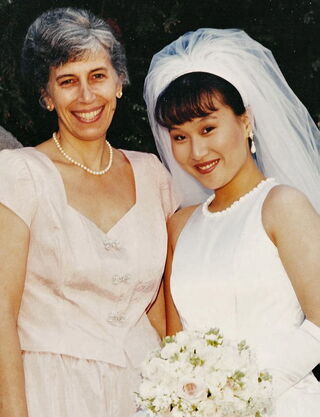
After college, I got married. Five years later, my husband and I were nervous but happy to discover I was pregnant. Once again, not having a biological family became an issue. Doctor after doctor asked me about my family’s medical history. I never had answers for them. Fortunately, it was a problem-free pregnancy and I spent most of my time pondering parenthood.
Finally the long expected day came. Bleary-eyed, we rushed to the hospital in the middle of the night. Eleven hours later, I gave birth to a little girl, and within 36 hours we were home. We were a family. In the flurry of emotions, I recall a vague satisfaction that I now had a family that would never be questioned for its reality or validity.
Once the adrenaline of new parenthood began to wear off, the weight of my new responsibilities fell upon me heavily. I had created a life. I had grown her inside me, and the bonds of love and duty were strong. My love for my new daughter was so overwhelming that the thought of being apart from her made me physically ache.
As friends stopped by to welcome the baby, it dawned on me that people were saying that she looked like me. It felt natural but strange at the same time. I couldn’t believe it! I finally had a relative who looked like me. Most people take family resemblances for granted, but I was astounded. My tiny newborn baby was my only known blood relative.
Since most of our family lived out-of-town, I quickly emailed a birth announcement with a picture so everyone could see how healthy and beautiful our daughter was. I eagerly called my mother to tell her to check her email. I knew she was anxious to see pictures of her first grandchild. Both excited, we sat on the phone together and waited for the picture to download. Suddenly she gasped. “I see her,” she said with a teary voice. “She looks so much like you. It’s like seeing you as the baby we never got to see.” Her statement rattled me. I had never thought of myself as a baby before. In my mind, my life had started when I was adopted. But I didn’t dwell on it just then. As a new mother, other things diverted my attention.
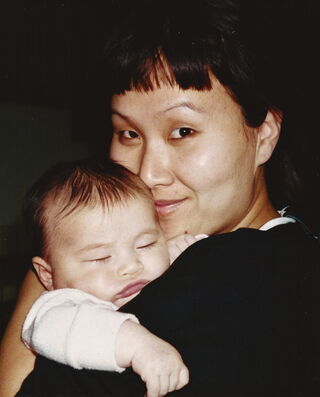
Although we hadn’t ruled out adoption for future children, I was secretly thrilled to have given birth to at least one of my children. I was fascinated by our physical similarities. Her fingers curved in the same delicate way that mine did. She had my same thick dark hair and her eyes were shaped exactly like mine. As the weeks passed, she started to look more like her father, but I could still see my face in her face and the sight felt miraculous. My love for her grew deeper with each passing day. I never knew how deep my devotion and passion for anyone, or anything, could be.
As the gut-wrenching exhaustion of new parenthood began to subside, I eased into the routine of life with a baby. One evening, I was startled to discover that from the depths of my love for her came a new sensation. As I sang my little girl to sleep one night, I started crying. I wept and clung to her as if I was grieving, and then I realized that I was. I was grieving for myself. I was crying for my own lost infancy that nobody remembers. I began to wonder about things in my past I had never before dared to think about.
Who sang me to sleep? Who rocked me when my stomach was gassy and uncomfortable? Who wrapped me with a blanket when it was cold? Questions flooded my brain. Even though my daughter was still so small, I could already see the fear in her eyes when she heard loud noises. I could see joy in her smile when she was happy. I could see her experiencing sadness and frustration. She wasn’t just a baby. She was a little person with needs and emotions. Vulnerable as she was, she had a mother and a father who would do anything to make her feel safe and loved. Who had made sure I was safe? Who had loved me?
Before I became a mother, I had thought of my life as having begun when I was adopted. But now my heart swelled with sadness. I felt stunned. I was overwhelmed by feelings I wasn’t prepared for.
For the first time in my life I began to wonder who my biological mother was and how she could have ever let me go. I cradled my daughter as she cooed in my arms, trying to picture my biological mother holding me. Nothing but death could separate me from my girl. How could my biological mother have felt any differently? That thought brought a new wave of grief to my heart. I wondered if my biological mother was even still alive. The details that are known about my abandonment had always led me to believe that she had simply not wanted me or that she was too poor to take care of me. But now I wondered if she had survived my childhood.
I tried to shake off the flood of thoughts and questions that filled my head, but I couldn’t. Every time I looked at my baby, my thoughts strayed back to my own infancy. I felt angry and distressed. With no way to get answers to my questions, my imagination began to run wild with fantasies about how I was cared for or uncared for.
Finally, I cautiously brought up my feelings to my mother. She kindly admitted that she’d been experiencing many of the same emotions. The birth of her granddaughter had rekindled sadness she’d long felt about my early childhood before we’d been brought together. She acknowledged that she and my father had always wondered what had happened to me, but that they had been comforted with the knowledge that I had been loved. I didn’t understand how she could know that or how that could be comforting. She held my hand and said, “We knew you’d been loved because you came to us knowing how to love. You were a very loving child. You showed affection for us and for other children right from the start. You wouldn’t have done that unless you’d been well-loved.”
Tears clouded my eyes as I absorbed the meaning of her words. It was both sad and wonderful. I had never given my birth mother and father credit for anything. I had tried to expel them from my life, barely allowing them to be a part of my consciousness. Now I realized that I had been wrong. Just as I knew it was a mistake to wish for a family that didn’t exist, it was also a mistake to try and re-write my past. Someone had made sure that I had survived those first perilous years. I came to my American family able to give and receive love. Somewhere out there had been people who had loved me and who had ensured I would survive, even if they didn’t.
My grief and anger slowly subsided, making way for understanding and forgiveness. I now appreciate what my biological parents did for me. I am able to forgive them for letting me go because where I ended up was so wonderful. I can sympathize with their grief, and I know that my salvation must have been their sacrifice.
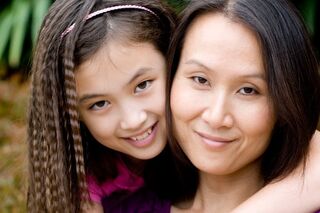
I still don’t have any desire to know my biological family, but I no longer resent them. My parents taught me how unimportant biology is, and my daughter taught me how important it is. It is one aspect of family, not to be ignored, but not to be looked upon as supreme either. My daughter is no more real to me than my adoptive parents are. My biological parents will forever be a part of me, but they’re not really family. My family is made up of the people who share my life and who have cared for me and comforted me through good years and through difficult years. Love is what makes my family real.
© 2012 Toni Bernhard and Mara Tyler
Part I: Giving Birth in an Airport
Part II: A New Life…and Clues to a Former One
